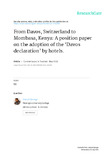| dc.contributor.author | Njoroge, Joseph M. | |
| dc.date.accessioned | 2016-09-28T16:04:55Z | |
| dc.date.available | 2016-09-28T16:04:55Z | |
| dc.date.issued | 2015 | |
| dc.identifier.uri | http://hdl.handle.net/123456789/97 | |
| dc.identifier.uri | http://www.tandfonline.com/doi/abs/10.1080/13683500.2015.1042360 | |
| dc.identifier.uri | https://www.researchgate.net/publication/273762086_From_Davos_Switzerland_to_Mombasa_Kenya_A_position_paper_on_the_adoption_of_the_'Davos_declaration'_by_hotels | |
| dc.identifier.uri | https://www.semanticscholar.org/paper/From-Davos%2C-Switzerland-to-Mombasa%2C-Kenya%3A-a-paper-Njoroge/158167fb80f411911b0d390abab906911b0e7f45 | |
| dc.description.abstract | Climate change has been identified as a major challenge in the achievement of sustainable development especially for developing countries like Kenya. There has been a wide acknowledgement that there is a need for long-term strategies for the industry players to reduce their contribution to climate change in line with other industries. Industries and societal sectors have sought ways of mitigating the causes
of climate change. The Second International Conference on Climate Change and
Tourism, held in Davos, Switzerland, on 3 October 2007, provided practical
guidelines for the industry in response to climate change. This paper seeks to
evaluate the adoption of the ‘Davos Declaration’ among selected Mombasa hotels in
terms of water, energy and waste management. Results indicate that despite wide
knowledge among hoteliers on the impacts of climate change and the role hotels can
play in its mitigation, most hoteliers are slow in adopting the mitigation measures. | en_US |
| dc.title | From Davos, Switzerland to Mombasa, Kenya: a position paper on the adoption of the ‘Davos declaration’ by hotels | en_US |

